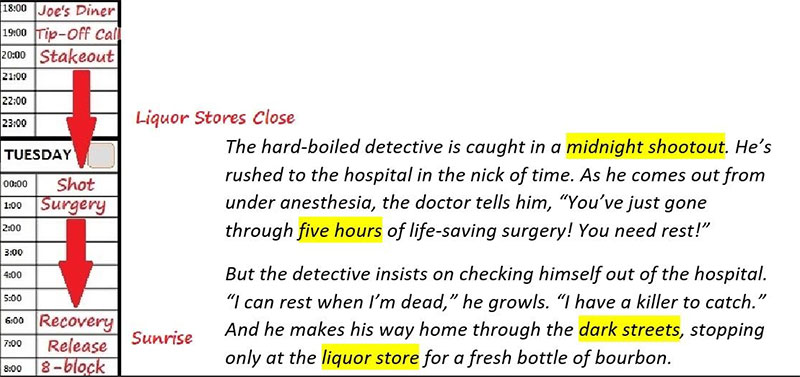
When we are babies, one of the first abstract notions our developing consciousnesses must reckon with is object permanence, the idea that people and things continue to exist even when we cannot see them. Watch an infant playing peek-a-boo with her parents. Hear her laugh of mingled surprise and delight as she opens her eyes to realize that Mama and Dada are still there.
 In mastering object permanence, we begin to understand the difference between objective reality and our subjective experience of it and to reconcile the two. Most of us achieve this while we are still small children.
In mastering object permanence, we begin to understand the difference between objective reality and our subjective experience of it and to reconcile the two. Most of us achieve this while we are still small children.
But there is one aspect of our lives where it is exceedingly difficult, even for adults, to sync our perspective to the absolute reality: the passage of time. The charming BBC film It’s About Time (1979; currently viewable on YouTube) examines how the human perception of time is inextricably tied to individual context, leaving most of us either falling behind the clock (“Good heavens, is it lunchtime already?”) or rushing ahead of it (“I can’t believe it’s only two o’clock!”) with some regularity.
Get a free sample proofread and edit for your fiction writing.
Two professional proofreaders will proofread and edit your fiction writing.
Reconciling objective and subjective chronology might seem simpler in fiction: after all, the author controls both the clock and the perceptions of the characters. But our everyday inaccuracy in estimating the passage of time carries over to our writing.
Distance
As we noted last month, the clock may seem to stop ticking when your viewpoint character is out of action, and being in transit is one of those limbo areas. How long does it take to get from Times Square to Greenwich Village by subway? By cab? Could your protagonist do it on their lunch hour and still be back in time to witness a murder by one o’clock? How far can an army march in a day? If you ride a horse from sunup till sundown, how far will you get? If your protagonist’s plane leaves Chicago at noon, what time will they arrive in Paris, and how jet-lagged will they be?
These are all things you can, and should, check with an online search. And if you need to reschedule that flight to Paris or the timing of that murder to suit your plot, it’s better you find out sooner than later.
External Events
While characters live their lives, the world moves on around them. And where their lives intersect with the larger world, especially with real-life events, you’ve got to do your research and know when those events fall.
Say you’re writing a coming-of-age piece about a student athlete spending her last summer before college in training for a marathon. Let’s make it the Boston Marathon, you might think. That’s a famous one! One problem: the Boston Marathon is always run in April, months before the action of the story. You’ll need to move your action to a different time of year or choose a different race.
Historical events can affect the deep background of your story, too. Is a Chinese character likely to have siblings? Not if they were born while Beijing’s one-child policy was in effect (1980–2015). Do your research.
Natural Phenomena
Consider this scenario:

If we read this literally, we can estimate that if the detective is shot at midnight, he would leave the hospital at 7:00 AM at the earliest. The streets wouldn’t be dark, and the liquor store wouldn’t be open. But we’re not always writing literally. Sometimes we use time-related expressions without thinking about their practical implications simply because they sound good.
“Midnight” is a point on the clock, but it’s also an evocative word, and “midnight shootout” certainly sounds more ominous than “10 p.m. shootout.” Similarly, “five hours of life-saving surgery” sounds more impressive than three hours and slightly more plausible than six hours. It works as a phrase, even if it doesn’t make logical sense. The meaning is subordinate to the music.
Character’s Consciousness
When the character is not paying attention to the passage of time, neither is the author. That mirrors our real-life experience too, the feeling that time passes more quickly when something absorbs our attention. That’s not true, of course; time always passes at the same rate. Plan accordingly.
Jack F.
Get a free sample proofread and edit for your fiction writing.
Two professional proofreaders will proofread and edit your fiction writing.
Get a free sample proofread and edit for your document.
Two professional proofreaders will proofread and edit your document.
We will get your free sample back in three to six hours!